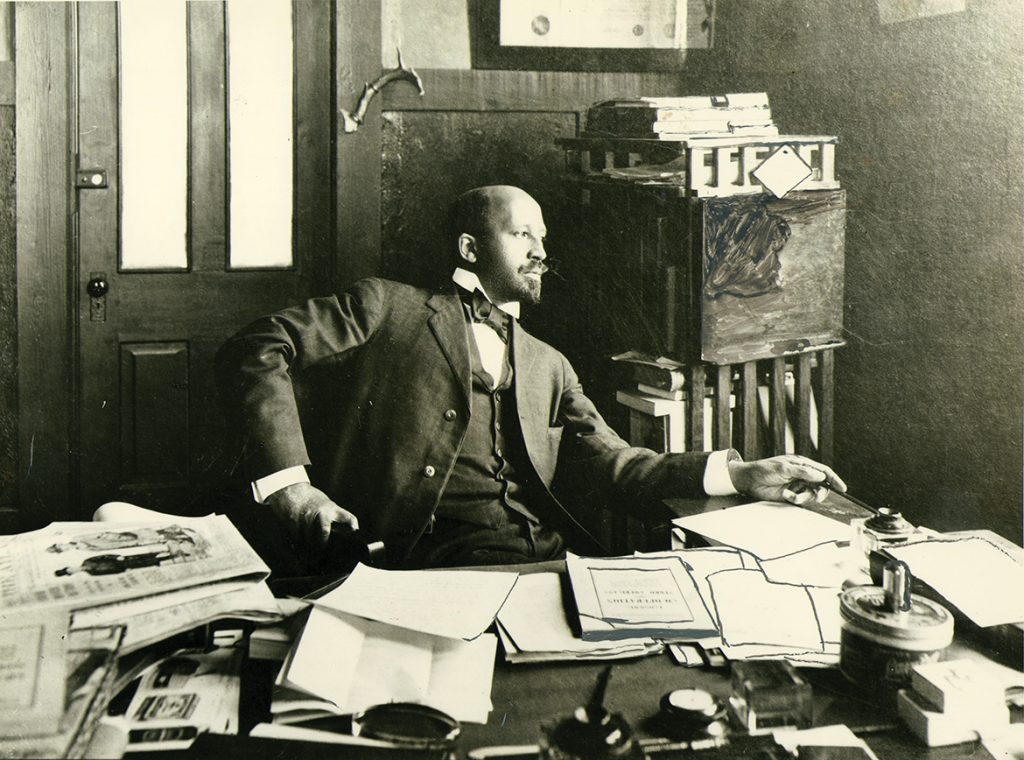Online Forum: W. E. B. Du Bois @ 150
*February 19-23, 2018
Black Perspectives, the blog of the African American Intellectual History Society (AAIHS), is hosting an online forum on W. E. B. Du Bois (1868-1963) in recognition of the 150th anniversary of his birth. The forum on Du Bois’s sesquicentennial will reassess well-known works such as his book The Souls of Black Folk. It will re-evaluate some of his popular concepts and phrases such as the “Talented Tenth” and “the problem of the twentieth century is the problem of the color line.” Referencing the ongoing centennial of World War I (which runs from 2014 to 2018), the forum will account for Du Bois’s published and unpublished reactions to African Americans and the war. It will address his creative writings in the realm of poetry, science fiction literature, and novels–work that spanned across his entire career. Finally, at the intersection of political and cultural legacy, the forum will recognize the dual anniversary in 2018 of Du Bois’s birth and the assassination of Martin Luther King, Jr. In sum, the forum prompts us to consider collectively Du Bois’s intellectual, social, political, and cultural importance to the past, present, and future.
Organized by Phillip Luke Sinitiere (College of Biblical Studies), the forum will feature essays from Whitney Battle-Baptiste (University of Massachusetts Amherst), Edward Carson (The Brooks School), Lavelle Porter (New York City College of Technology, CUNY), Roopika Risam (Salem State University), Britt Rusert (University of Massachusetts Amherst), Stephanie Shaw (The Ohio State University), and Chad Williams (Brandeis University). The forum begins on Monday, February 19, 2018 and concludes on Du Bois’s birthday on Friday, February 23, 2018.
During the week of the online forum, Black Perspectives will publish new blog posts every day at 5:30AM EST. Please follow Black Perspectives (@BlkPerspectives) and AAIHS (@AAIHS) on Twitter; like AAIHS on Facebook; or subscribe to our blog for updates. By subscribing to Black Perspectives, each new post will automatically be delivered to your inbox during the week of the forum.
About the Participants
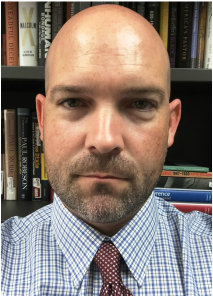 Phillip Luke Sinitiere is currently a Professor of History at the College of Biblical Studies, a multiethnic school located in Houston’s culturally rich Mahatma Gandhi District. In 2009, he received a Ph.D. in history from the University of Houston. As a scholar of American religious history and African American Studies, his publications examine the American prosperity gospel, the history of evangelical Christianity, televangelism, African American religion, Black intellectual history, and the work of W. E. B. Du Bois. His books include Holy Mavericks: Evangelical Innovators and the Spiritual Marketplace, with Shayne Lee (New York University Press, 2009); Christians and the Color Line: Race and Religion after Divided by Faith, with J. Russell Hawkins (Oxford University Press, 2013); Protest and Propaganda: W. E. B. Du Bois, The Crisis, and American History, with Amy Helene Kirschke (University of Missouri Press, 2014); and Salvation with a Smile: Joel Osteen, Lakewood Church, and American Christianity (New York University Press, 2015). At present, he is at work on several projects related to W. E. B. Du Bois, along with a short biography of James Baldwin for Rowman & Littlefield’s Library of African American Biography series.
Phillip Luke Sinitiere is currently a Professor of History at the College of Biblical Studies, a multiethnic school located in Houston’s culturally rich Mahatma Gandhi District. In 2009, he received a Ph.D. in history from the University of Houston. As a scholar of American religious history and African American Studies, his publications examine the American prosperity gospel, the history of evangelical Christianity, televangelism, African American religion, Black intellectual history, and the work of W. E. B. Du Bois. His books include Holy Mavericks: Evangelical Innovators and the Spiritual Marketplace, with Shayne Lee (New York University Press, 2009); Christians and the Color Line: Race and Religion after Divided by Faith, with J. Russell Hawkins (Oxford University Press, 2013); Protest and Propaganda: W. E. B. Du Bois, The Crisis, and American History, with Amy Helene Kirschke (University of Missouri Press, 2014); and Salvation with a Smile: Joel Osteen, Lakewood Church, and American Christianity (New York University Press, 2015). At present, he is at work on several projects related to W. E. B. Du Bois, along with a short biography of James Baldwin for Rowman & Littlefield’s Library of African American Biography series.
 Whitney Battle-Baptiste is an Associate Professor of Anthropology at the University of Massachusetts Amherst. Her academic training is in history and historical archaeology and her research is primarily focused on how the intersection of race, gender, class, and sexuality look through an archaeological lens. Her work has included interpreting captive African domestic spaces at Andrew Jackson’s Hermitage Plantation, school segregation in 19th century Boston at the Abiel Smith School on Beacon Hill, the Burghardt family homestead, also known as the W. E. B. Du Bois Homesite in Great Barrington, Mass., and her most recent work on the complexities of navigating a community-based archaeological project at the Millars Plantation site on the Bahamian island of Eleuthera. Her first book, Black Feminist Archaeology (Left Coast Press, 2011), outlines the basic tenets of Black feminist thought and research for archaeologists and shows how it can be used to improve contemporary historical archaeology as a whole. She is also serving as the Director of the W. E. B. Du Bois Center at UMass Amherst. Follow her on Twitter @blackfemarch.
Whitney Battle-Baptiste is an Associate Professor of Anthropology at the University of Massachusetts Amherst. Her academic training is in history and historical archaeology and her research is primarily focused on how the intersection of race, gender, class, and sexuality look through an archaeological lens. Her work has included interpreting captive African domestic spaces at Andrew Jackson’s Hermitage Plantation, school segregation in 19th century Boston at the Abiel Smith School on Beacon Hill, the Burghardt family homestead, also known as the W. E. B. Du Bois Homesite in Great Barrington, Mass., and her most recent work on the complexities of navigating a community-based archaeological project at the Millars Plantation site on the Bahamian island of Eleuthera. Her first book, Black Feminist Archaeology (Left Coast Press, 2011), outlines the basic tenets of Black feminist thought and research for archaeologists and shows how it can be used to improve contemporary historical archaeology as a whole. She is also serving as the Director of the W. E. B. Du Bois Center at UMass Amherst. Follow her on Twitter @blackfemarch.
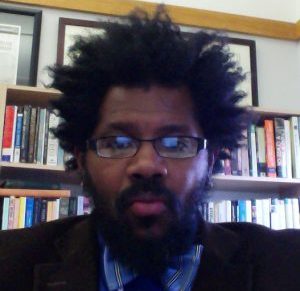 Edward Carson is a residential faculty member in the History Department of Brooks School in North Andover, Massachusetts. At Brooks he is a former faculty advisor and active participant for Gay-Straight Alliance. He sits on the standing Diversity Leadership Council. He received his B.A. in History and M.Ed. in History Education from Harding University. His current research examines race, religion, and society, particularly that of W.E.B. Du Bois. He does editorial work for The Christian Century Magazine Then and Now, and sits on the Christian Scholars’ Conference Committee. He is the co-author with John P. Irish of Historical Thinking Skills: A Workbook for European History. He is currently working on a book titled W.E.B. Du Bois’s Editorial Influence on Western Negro Migration. Follow him on Twitter @ProfCarson44.
Edward Carson is a residential faculty member in the History Department of Brooks School in North Andover, Massachusetts. At Brooks he is a former faculty advisor and active participant for Gay-Straight Alliance. He sits on the standing Diversity Leadership Council. He received his B.A. in History and M.Ed. in History Education from Harding University. His current research examines race, religion, and society, particularly that of W.E.B. Du Bois. He does editorial work for The Christian Century Magazine Then and Now, and sits on the Christian Scholars’ Conference Committee. He is the co-author with John P. Irish of Historical Thinking Skills: A Workbook for European History. He is currently working on a book titled W.E.B. Du Bois’s Editorial Influence on Western Negro Migration. Follow him on Twitter @ProfCarson44.
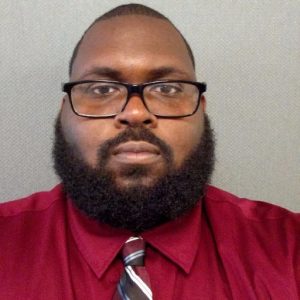 Lavelle Porter is a writer, and a scholar of African American literature. He is an Assistant Professor of English at New York City College of Technology, CUNY. He holds a B.A. in history from Morehouse College, and a Ph. D. in English from the CUNY Graduate Center. His writing has appeared in venues such as The New Inquiry, Poetry Foundation, Callaloo, Warscapes and JSTOR Daily. His research interests include African American literature, higher education, intellectual history, science fiction, Afrofuturism, gender, and sexuality. He is currently working on a book about representations of Black higher education in popular culture. Follow him on Twitter @alavelleporter.
Lavelle Porter is a writer, and a scholar of African American literature. He is an Assistant Professor of English at New York City College of Technology, CUNY. He holds a B.A. in history from Morehouse College, and a Ph. D. in English from the CUNY Graduate Center. His writing has appeared in venues such as The New Inquiry, Poetry Foundation, Callaloo, Warscapes and JSTOR Daily. His research interests include African American literature, higher education, intellectual history, science fiction, Afrofuturism, gender, and sexuality. He is currently working on a book about representations of Black higher education in popular culture. Follow him on Twitter @alavelleporter.
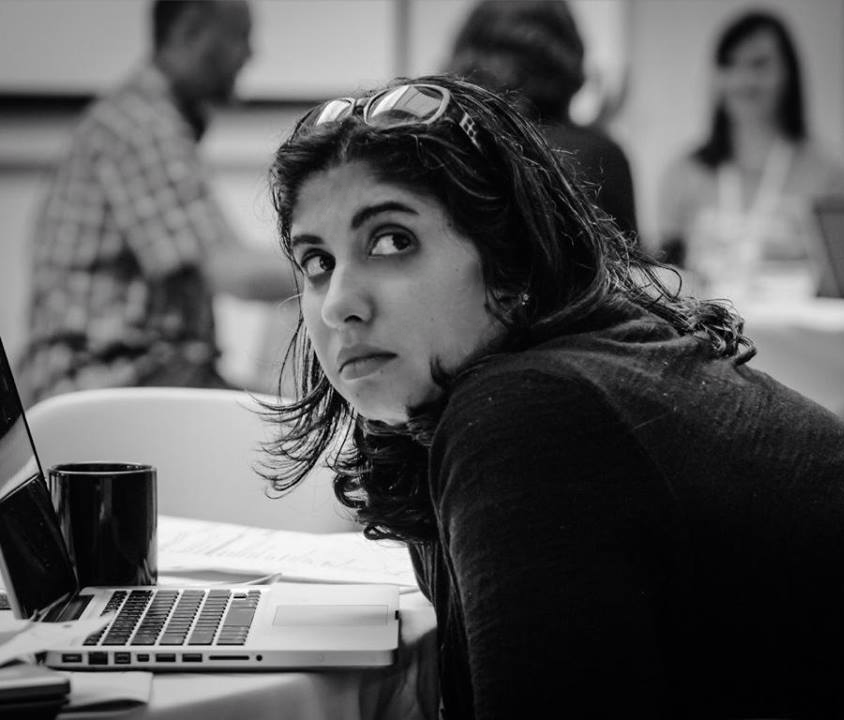 Roopika Risam currently serves as Assistant Professor of English, Coordinator of the Digital Studies Graduate Certificate Program, Digital Humanities Coordinator, and Chair of the Program Area for Content Educators at Salem State University. Her research examines intersections between postcolonial, African American, and US ethnic studies, and the role of digital humanities in mediating between them. Her monograph New Digital Worlds: Postcolonial Digital Humanities in Theory, Praxis, and Pedagogy will be published by Northwestern University Press in 2018. Her current book project examines W.E.B. Du Bois’s influence on knowledge infrastructures in the humanities. She is also co-editor of Debates in the Digital Black Atlantic for the Debates in the Digital Humanities series (University of Minnesota Press). Her digital projects include The Harlem Shadows Project, a digital critical edition of Claude McKay’s poetry; Visualizing Du Bois, a mapping project of W.E.B. Du Bois’s correspondence; and Digital Salem, a portal for small-scale, student-led digital humanities projects that tell the untold stories of Salem, Massachusetts. Follow her on Twitter @roopikarisam.
Roopika Risam currently serves as Assistant Professor of English, Coordinator of the Digital Studies Graduate Certificate Program, Digital Humanities Coordinator, and Chair of the Program Area for Content Educators at Salem State University. Her research examines intersections between postcolonial, African American, and US ethnic studies, and the role of digital humanities in mediating between them. Her monograph New Digital Worlds: Postcolonial Digital Humanities in Theory, Praxis, and Pedagogy will be published by Northwestern University Press in 2018. Her current book project examines W.E.B. Du Bois’s influence on knowledge infrastructures in the humanities. She is also co-editor of Debates in the Digital Black Atlantic for the Debates in the Digital Humanities series (University of Minnesota Press). Her digital projects include The Harlem Shadows Project, a digital critical edition of Claude McKay’s poetry; Visualizing Du Bois, a mapping project of W.E.B. Du Bois’s correspondence; and Digital Salem, a portal for small-scale, student-led digital humanities projects that tell the untold stories of Salem, Massachusetts. Follow her on Twitter @roopikarisam.
 Stephanie Shaw is Professor of History at the Ohio State University. Her major fields of study include American Women’s, Labor, and Social history. In 1996, Shaw published What a Woman ought to Be and to Do: Black Professional Women Workers during the Jim Crow Era (University of Chicago Press), a book about the family, work, and community lives of Black women who worked in the feminized professions between about 1880 and 1955. In 2015, she published W. E. B. Du Bois and The Souls of Black Folk (University of North Carolina Press), which offers a new perspective on Du Bois’s iconic study as a major work of philosophy. She is currently completing a book tentatively titled “Grandmothers, Granny Women, and Old Aunts: Rethinking Slave Families and Communities in the Nineteenth Century South.”
Stephanie Shaw is Professor of History at the Ohio State University. Her major fields of study include American Women’s, Labor, and Social history. In 1996, Shaw published What a Woman ought to Be and to Do: Black Professional Women Workers during the Jim Crow Era (University of Chicago Press), a book about the family, work, and community lives of Black women who worked in the feminized professions between about 1880 and 1955. In 2015, she published W. E. B. Du Bois and The Souls of Black Folk (University of North Carolina Press), which offers a new perspective on Du Bois’s iconic study as a major work of philosophy. She is currently completing a book tentatively titled “Grandmothers, Granny Women, and Old Aunts: Rethinking Slave Families and Communities in the Nineteenth Century South.”
 Britt Rusert is Assistant Professor in the W. E. B. Du Bois Department of Afro-American Studies at the University of Massachusetts Amherst and the author of Fugitive Science: Empiricism and Freedom in Early African American Culture (New York University Press, 2017). Rusert received her Ph.D. in English and certificate in Feminist Studies from Duke University. Her research and teaching focus on African American literature and visual culture, American literatures to 1900, Afrofuturism, science and technology studies, gender and sexuality, and critical theory. She is currently working on a study of William J. Wilson’s “Afric-American Picture Gallery” (1859), a text that imagines the first museum of black art in the United States. With Adrienne Brown, she is also editing W. E .B. Du Bois’s short genre fiction. Their edition of Du Bois’s fantasy story, “The Princess Steel,” was published in PMLA. Follow her on Twitter @brittrusert.
Britt Rusert is Assistant Professor in the W. E. B. Du Bois Department of Afro-American Studies at the University of Massachusetts Amherst and the author of Fugitive Science: Empiricism and Freedom in Early African American Culture (New York University Press, 2017). Rusert received her Ph.D. in English and certificate in Feminist Studies from Duke University. Her research and teaching focus on African American literature and visual culture, American literatures to 1900, Afrofuturism, science and technology studies, gender and sexuality, and critical theory. She is currently working on a study of William J. Wilson’s “Afric-American Picture Gallery” (1859), a text that imagines the first museum of black art in the United States. With Adrienne Brown, she is also editing W. E .B. Du Bois’s short genre fiction. Their edition of Du Bois’s fantasy story, “The Princess Steel,” was published in PMLA. Follow her on Twitter @brittrusert.
 Chad Williams is Associate Professor and Chair of the Department of African and Afro-American Studies at Brandeis University. Chad earned a BA with honors in History and African American Studies from UCLA, and received both his MA and Ph.D. in History from Princeton University. He specializes in African American and modern United States History, African American military history, the World War I era and African American intellectual history. His first book, Torchbearers of Democracy: African American Soldiers in the World War I Era, was published in 2010 by the University of North Carolina Press. He is co-editor of Charleston Syllabus: Readings on Race, Racism and Racial Violence (University of Georgia Press, 2016) and Major Problems in African American History, Second Edition (Cengage Learning, 2016). He is currently completing a study of W. E. B. Du Bois and World War I. Follow him on Twitter @Dr_ChadWilliams.
Chad Williams is Associate Professor and Chair of the Department of African and Afro-American Studies at Brandeis University. Chad earned a BA with honors in History and African American Studies from UCLA, and received both his MA and Ph.D. in History from Princeton University. He specializes in African American and modern United States History, African American military history, the World War I era and African American intellectual history. His first book, Torchbearers of Democracy: African American Soldiers in the World War I Era, was published in 2010 by the University of North Carolina Press. He is co-editor of Charleston Syllabus: Readings on Race, Racism and Racial Violence (University of Georgia Press, 2016) and Major Problems in African American History, Second Edition (Cengage Learning, 2016). He is currently completing a study of W. E. B. Du Bois and World War I. Follow him on Twitter @Dr_ChadWilliams.

